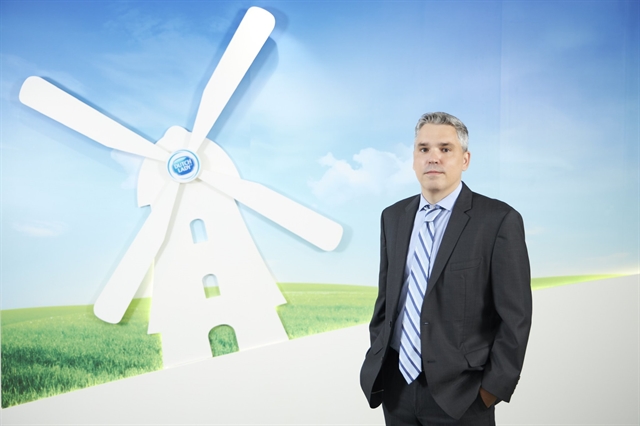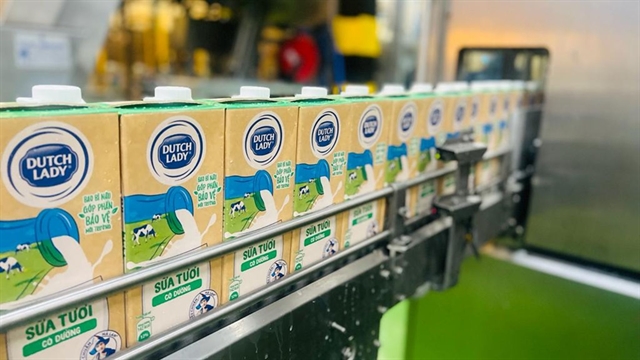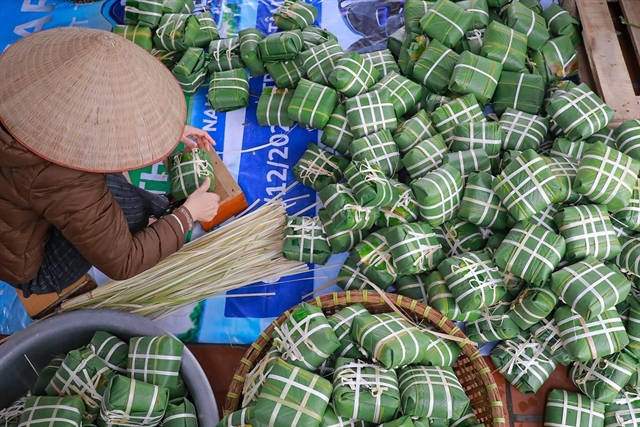 Economy
Economy

HCM CITY — The sustainable development strategy of “Nourishing a Better Planet” is helping FrieslandCampina Việt Nam, one of the world's largest dairy cooperatives, achieve new success milestones.
In the context of huge challenges facing the global economy, FrieslandCampina Việt Nam (FCV) has unveiled a strategy that dovetails with Việt Nam's own sustainability priorities.
In a recent interview with Nhịp Cầu Đầu Tư (Investment Bridge) magazine, FCV’s general director Richard Kiger spoke about this sustainability strategy.

|
| Richard Kiger, FCV’s general director. — Photo courtesy of FCV |
Sustainability is a topic of interest for the business community. How does FCV address this?
The COVID-19 pandemic may have had a severe negative impact on the global economy and even loss of human life, but caused people to take a look back at all activities and appreciate everything more.
Therefore, sustainable development is the most appropriate and timely direction in this difficult period.
The strategy is in line with the global nutrition group Royal FrieslandCampina’s mission of “Nourishing by Nature,” which includes commitments to offer high-quality nutritious products to consumers all over the world and reduce the environmental impact on the planet.
In Việt Nam, it focuses on four main goals: mitigating the impacts of climate change, using environment-friendly packaging, improving the lives of farmers, and providing consumers with high-quality nutritious products.
What positive impacts will the sustainability strategy have on consumers, society and the planet?
We know that all governments, businesses and individuals face challenges posed by climate change.
We are proud to provide consumers with high-quality nutritious products at affordable prices, which is a key goal in our sustainability strategy.
Royal FrieslandCampina is one of only five dairy and nutrition companies in the world that are more than 150 years old, operates in 32 countries and exports to more than 100 markets.
Everyday the company serves millions of consumers living in developed countries in the EU and in developing countries that are growing rapidly but also facing many environmental problems.
It's our deep presence in consumers' daily lives that makes us so concerned with the impacts we create.
The company was deeply engaged with sustainable development long before sustainable development became an inevitable global trend.
It was the first in the global dairy industry to instal carbon footprint monitors at all its dairy farms.
Together with Rabobank and the Wildlife Fund (WWF), we have set up a biodiversity assessment system that helps farms monitor the health of dairy cows and food safety standards.
The company is also the first in the world to introduce a system that helps farmers forecast and mitigate the environmental impacts on their farms by implementing measures to reduce CO2 emissions, and conserves biodiversity.
We never stop innovating, today or in the future.

|
| Better nutrition for Vietnamese children to leap forward and reach higher. — Photo courtesy of FCV |
Can you tell us about the dairy development programme bearing the imprint of FCV and its Dutch Lady brand?
FrieslandCampina’s dairy development programme, which enshrines certain community values, began when the company entered the Vietnamese market in 1995.
So far, nearly 2,500 dairy farming households have participated in this programme.
Every year the company organises some 12,000 training sessions for member farmers.
It also transfers technology and shares its experience with partner farmers to improve productivity and milk quality, and achieve eco-friendly farming.
By 2025, it plans to take the total number of farmers it has trained to 300,000.
Through knowledge transfer I believe farmers will make great changes to the dairy industry and agriculture in Việt Nam in general.

|
| Environment-friendly brown paper boxes. — Photo courtesy of FCV |
What motivates FCV to undertake activities to ensure sustainability in Việt Nam despite your business facing many challenges?
We consider the sustainable development orientation a competitive advantage and differentiating factor.
The dairy development programme and the environment-friendly brown paper boxes launched by FrieslandCampina’s Dutch Lady brand have received positive feedback from our business partners and consumers.
We get a great deal of appreciation from everyone. FrieslandCampina is not alone in the process of taking care of the planet. It is accompanied by consumers.
Thanks to the strong support and cooperation it gets from all sectors, consumers and business partners, FrieslandCampina is steadfast in keeping its sustainable development at the centre of its business strategy.
Where do you see Việt Nam's dairy industry in the coming period?
I believe Việt Nam's dairy industry will continue to have great potential in future.
Việt Nam is still a developing country but has achieved a number of targets it set for improving the nutritional status of its population.
But the latest South East Asian Nutrition Surveys (SEANUTS II) show that the country still has to deal with three nutritional burdens on children: rickets, overweight and obesity, and micronutrient deficiency.
The natural nutrients in milk are considered an ultimate source of nutrition, and so the dairy industry has a great responsibility in helping address the nutritional challenges facing Vietnamese children.
Therefore, our Dutch Lady brand is joining hands with all partners, including the Ministry of Education and Training, to improve understanding of the importance of a nutritious breakfast for children.
FrieslandCampina is continuing with its mission of ‘For Việt Nam to Leap Forward and Reach Higher’ to provide high-quality and nutritious dairy products to consumers, especially children. — VNS




